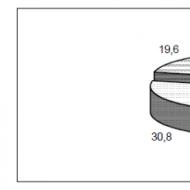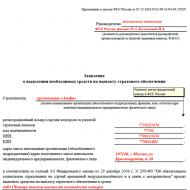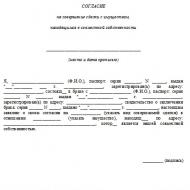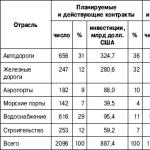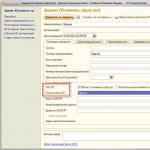
How long should primary accounting documents be kept? Terms and procedure for storing accounting documents. Accounting and business documents
Reporting and registers for a certain period of time is a requirement of current legislation.
It means that within the specified period access to documents and the possibility of their full use should be ensured if necessary.
What documents require mandatory storage?
Documents requiring mandatory storage, conditionally can be divided for documents:
- which are in operation during the reporting year;
- which are always necessary in work, despite the fact that they are not used daily.
TO first group documents include:
Keep documents related to the first group are required:
- for accounting purposes (Article 29, Law “On Accounting” No. 402-FZ) - at least five years from the end of the reporting year or the year in which these documents were last used;
- for purposes tax accounting(Article 23, Tax Code of the Russian Federation) - for a period of at least 4 years. At the same time, the Code may establish longer storage periods. For example, a participant investment project subject of the Russian Federation is obliged to store all documents for 6 years. And to confirm the amount of loss incurred - for the entire period during which it is reduced with its help and which can be calculated in more than one or two years.
 Co. second group These include documents that must be stored at the enterprise during the entire period of its activity. In particular, for LLCs the Law “On Limited Liability Companies” No. 14-FZ provides the following list of mandatory storage on-site documentation:
Co. second group These include documents that must be stored at the enterprise during the entire period of its activity. In particular, for LLCs the Law “On Limited Liability Companies” No. 14-FZ provides the following list of mandatory storage on-site documentation:
- registration documents, including the constituent meeting (decision) on the creation of the company;
- documents confirming ownership of property on the company’s balance sheet;
- minutes documenting meetings of founders and other persons;
- documents on the issue of securities;
- provisions on separate divisions enterprises;
- lists of affiliates;
- conclusions of various regulatory authorities on certain issues of the enterprise’s activities (on inspections carried out, etc.);
- and other documents that the enterprise must have in accordance with current legislation.
How long should accounting documents be kept?
The general shelf life of any accounting documents– no less than 5 years.
But in some cases it can be much higher. Pivot table with shelf life is presented below.
| Types of documentation | Shelf life |
|---|---|
| Primary documents, accounting registers, reporting and auditors’ opinions thereon, accounting policies and other documentation on the organization and maintenance of accounting at the enterprise | Taking into account the deadlines established in the Rules for Archiving, but not less than five years |
| Inventory cards for retired fixed assets | During the period established by the head of the enterprise, taking into account the archival Rules, but not less than a five-year period |
| Copies of documents or their counterfoils that confirm the acceptance of cash by the enterprise, including for payments with payment cards | At least five years |
| Documentation on the release, acquisition, maintenance, registration and commissioning of cash register equipment. ECLZ and other fiscal drives | At least 5 years from the date of final application of these documents |
| Control tapes, cashier-operator logs and other documents that confirm cash payments made with customers | Within the time limits established for primary documentation but not less than five years |
| Passport for cash register equipment | For the entire validity period of the Passport |
| A book that takes into account the movement of work books. A book designed to record blank forms of work books | Stored for 50 years. But in the event of liquidation of the company upon delivery personnel documents- 75 years |
| Holiday schedule | one year |
| Provisions: - about the training system operating in the company; - about employee certification. | Constantly |
| Labor agreements. Orders: - about hiring; - transfer of an employee to another job; - about dismissal. Applications from employees for leave without pay. Personal cards of staff. | 75 years old |
| Job Descriptions | Constantly |
| Orders for granting vacations | five years |
| Work records | While the employee is working. If there are unclaimed books, then for at least 50 years with their subsequent delivery to the archives |
| Agreements for full financial responsibility of employees | 5 years |
| Books that take orders into account: | |
| - on the main activity; | 5 years |
| - hiring an employee; | 75 years old |
| - dismissal of employees; | 75 years old |
| - on providing employees with vacations. | 50 years |
| Journal of registration of travel certificates | 5 years |
| Time sheet. Shift schedule (for shift work). | 1 year |
| Lists of people employed in hazardous production. Work orders and time sheets for employees with hazardous professions | 75 years old |
| Instructions containing provisions on labor protection | Store permanently |
| Accident reports | 45 years |
| Safety Instruction Magazine | 10 years |
| Journal of employees undergoing a mandatory medical examination | 5 years |
Despite the fact that a significant part of this list consists of personnel documents, they are an integral part accounting. On their basis, accrual occurs and compensation payments, and rewards, as well as various benefits.
The storage periods for reporting documentation are described in the following video:
If you have not yet registered an organization, then easiest way do this using online services, which will help you generate all the necessary documents for free: If you already have an organization, and you are thinking about how to simplify and automate accounting and reporting, then the following online services will come to the rescue, which will completely replace an accountant in your company and save a lot money and time. All reporting is generated automatically, signed electronically and sent automatically online. It is ideal for individual entrepreneurs or LLCs on the simplified tax system, UTII, PSN, TS, OSNO.
Everything happens in a few clicks, without queues and stress. Try it and you will be surprised how easy it has become!
Order and storage location
 To organize document storage, the enterprise can:
To organize document storage, the enterprise can:
- or turn to the services of a special archival organization;
- or create your own archive. This is permitted by Article 13 of the Law “On Archival Affairs” No. 125-FZ of October 22, 2004.
Creating own archive, the enterprise must allocate a separate room for these purposes and equip it with racks, shelves or closets. If there are windows in this room, they must be curtained or otherwise shaded to prevent sunlight from entering the documents, causing them to fade.
In addition, you need your own archive room equip with protection from unauthorized access and from fires - a metal entrance door, bars on the windows and an alarm system.
To organize a quick search necessary documents should develop a list of cases.
In case of transfer of cases for their storage at specialized structure, it is necessary to choose an organization that is equipped with modern equipment and all conditions for long-term storage of documents, including the presence of fire alarms and access control systems.
Regarding documents on registration of an organization, her and other similar documents, they are usually kept by the head of the organization in originals and in a safe. And their copies are in the accounting department.
Employees of the enterprise, their blank forms and inserts for them must always be in personnel service or in the accounting department, if it is entrusted with personnel records management. Wherein work books are always kept in a safe.
It is worth noting that documents in electronic form must be protected from unauthorized changes to them, and at the same time their storage must provide the ability to create a copy on paper if necessary.
Transfer of documentation to the archive
Documents are transferred to the archive for long-term (more than 10 years) and permanent storage.
Transferring these materials to the archive carried out according to the schedule approved by the head of the organization in the order on the formation of the archive.
 The same order appoints a person responsible for maintaining the archive and approves the rules:
The same order appoints a person responsible for maintaining the archive and approves the rules:
- depositing documents in the archive and issuing them;
- maintaining an archive;
- destruction of documents whose storage period has expired;
- organizing events for the preservation of archival files.
All documents in the archive are accepted only in the form of originals, and in their absence - in the form of certified copies. The transferred documents must be bound according to some indication, and on the cover of their file there is a mark identifying information, in particular:
- year of execution of documents;
- accounting area;
- serial numbers;
- the period for which registers and primary documents were generated;
- type of documents filed;
- number of sheets filed, etc.
As for submitting documents to the archive in electronic form, this procedure is approved separately in the Order of the head on the archive of the organization. But usually these documents are first duplicated onto other media.
An example of storing accounting documentation is presented in the following video:
What to do in case of loss
 Documents can be lost either due to a natural disaster or as a result of the actions of third parties or one's own employees. But in any case, confirmation of the fact of loss by the relevant authorities will be required. These could be law enforcement agencies (if documents are stolen), or fire authorities (if documents are burned), etc.
Documents can be lost either due to a natural disaster or as a result of the actions of third parties or one's own employees. But in any case, confirmation of the fact of loss by the relevant authorities will be required. These could be law enforcement agencies (if documents are stolen), or fire authorities (if documents are burned), etc.
If the destruction or loss of documentation is detected, the head of the organization, by his order, must form a commission to find out the reasons for the identified fact. If necessary, representatives of a security company, fire department or investigative structure may be invited to participate in the investigation.
Based on the results of an internal investigation an act is drawn up in any form with a statement of all the facts. This act becomes an excuse for the lack of documents if they are requested by regulatory authorities.
What to do with documents if their storage period has expired?
 Before destroying documentation you will need conducting an examination her values. For this purpose, a permanent commission is created at the enterprise by order of the manager. It should include specialists who are able to give a qualified assessment of the need to destroy certain documents.
Before destroying documentation you will need conducting an examination her values. For this purpose, a permanent commission is created at the enterprise by order of the manager. It should include specialists who are able to give a qualified assessment of the need to destroy certain documents.
It is this commission that makes a decision on the destruction of documents if they can no longer be stored for a period of time. Their destruction is carried out by drawing up an act in any form, which must have required details primary document and which needs to be approved Accounting policy enterprises.
Before destruction there must be inventory carried out documents for a certain period. Without this procedure, documentation cannot be destroyed.
If storage rules are violated?
Responsibility for this violation There are tax and administrative, in particular:
- officials can be punished if they do not store documents within the legal period, from 5 thousand to 10 thousand rubles. If this violation is detected again - 10-20 thousand rubles or disqualification for 1-2 years (Administrative Code of the Russian Federation, Article 15.11);
- an organization for the same acts can be punished by 10 thousand rubles, and in case of repeated violations - by 30 thousand rubles (Tax Code of the Russian Federation, Art. 120).
For information on penalties for these violations, see the following video:
The largest number of papers accumulate in the accounting department. And sometimes the archive becomes so voluminous that there is simply nowhere to store new documents. It is necessary to decide how long it is necessary to ensure the storage of document archives. After all, if you destroy documents ahead of schedule, there will be nothing to justify the costs. During the audit, tax authorities will deduct expenses and VAT deductions, and add additional taxes, fines and penalties. Therefore, the shelf life must be calculated impeccably.
How and for how long to store documents
There are three regulatory documents, which regulate the shelf life of papers:
- Tax Code of the Russian Federation;
- Law on Accounting dated December 6, 2011 No. 402-FZ;
- list approved by order of the Ministry of Culture of Russia dated August 25, 2010 No. 558.
It is quite large, but only three sections are needed for work: 4 “Accounting and reporting”, 7 “Labor relations” and 8 “Staffing”.
If you look at the code, law and order of the Ministry of Culture, you will see that each of them approves a different storage period for the same papers. The Accounting Law states that the company must store primary documents, registers and reports for the period specified in the order of the Ministry of Culture, but not less than five years (Part 1 of Article 29 of the Law of December 6, 2011 No. 402- Federal Law). In this case, one should take as the starting point not the date of drawing up the document, but January 1 of the next year. This is written in paragraph 1.4 of Section I of the list from the order of the Ministry of Culture. Accounting documents must be kept for at least five years.
How long to store documents
|
Documentation |
Shelf life |
|
Accounting (financial) statements: |
Dates: |
|
Accounting and documents for it (chart of accounts, forms of primary accounting documents, etc.) |
At least five years after the year in which the accounting policy was last used for reporting |
|
Registers ( main book, turnover statements, account cards, etc.) |
At least five years |
|
Fixed asset accounting cards |
At least five years after the liquidation of the facility |
|
Books of purchases and sales, journal of received and issued invoices |
At least four years from the date of last entry |
|
Documents (acts, certificates) on acceptance of work performed under work contracts that relate to the company’s activities |
Within five years after the expiration of the contract |
|
Invoices |
At least four years |
|
Reporting to the Social Insurance Fund |
Annual - continuously, and quarterly - for six years |
|
Reporting to Pension Fund |
A minimum of six years, and if the organization does not have personal accounts and payroll records, then at least 75 years |
|
Individual information in the Pension Fund for employees |
At least 75 years old |
|
Declarations for all taxes |
At least five years |
|
Information about the income of individuals |
At least five years, and if there are no personal accounts or payroll records - at least 75 years |
|
Register of information on the income of individuals |
At least 75 years old |
|
Reporting to statistics: |
Constantly; |
|
Correspondence about penalties and fines imposed on the company |
At least five years |
|
Treaties, agreements and additional documents thereto |
Within five years after expiration (unless otherwise specified in individual items of the list) |
|
Powers of attorney for receiving money and goods and materials |
At least five years |
|
Employment contracts and personal cards of employees |
For 75 years |
|
Documents for the issuance of salaries, benefits, fees, financial assistance and other payments |
At least five years, and in the absence of personal accounts - at least 75 |
|
Time sheets, working time logs |
At least five years (at least 75 years under dangerous, difficult and harmful working conditions) |
The safety of tax accounting documents must be ensured strictly for four years. This is stated in subparagraph 8 of paragraph 1 of Article 23 of the Tax Code of the Russian Federation. In this case, four years must be counted from the next day after the end of the tax period (year or quarter) in which the company used this document.
For example, you have in your hands a kit from a supplier - an invoice and a delivery note. The date of issue of documents is August 10, 2015. The delivery note must be kept for five years. After all, it is the primary document. You use it not only in tax, but also in accounting. The countdown begins on January 1, 2016. Therefore, the document must be stored until January 1, 2021.
The invoice storage period is four years. After all, it is not a primary document (letter dated July 12, 2005 No. 03-04-11/154). Therefore, the minimum five-year period from the Accounting Law does not apply to it. The purpose of the invoice is exclusively tax - to confirm the right to VAT deductions. In addition, the shelf life is four years and is on the list of the Ministry of Culture (item 368 of the list).
Start counting four years on the invoice from the next day after the end of the quarter in which VAT on the document was deducted. Let's say you declared an invoice deduction in the third quarter, then the starting point is October 1, 2015. It turns out that the company can destroy the document only after October 1, 2019.
So, we found out that the storage of archives of primary documents must be ensured for at least five years. This is precisely the requirement established in the Accounting Law.
At the same time, the storage period for tax accounting documents is four years. However, in some cases, inspectors will have the right to request documents beyond four years (see table below. - Editor's note). I will dwell on this in more detail.
When inspectors have the right to request documents beyond four years
|
Documentation |
Shelf life |
Example |
|
For losses that the company carries forward to the future |
During the entire period of the loss carry forward, plus an additional four years after the company has written off the loss in full |
In 2013, the company suffered a loss. And in 2014 and 2015, she fully took it into account in expenses. In this case, documents confirming the loss must be kept until the end of 2019 |
|
For written off receivables or debts |
Four years from the date the bad debt was written off as income or expense |
The Company included uncollectible accounts receivable in 2014 expenses. The organization will store documents confirming the debt until the end of 2018 |
|
By fixed assets |
Within four years after: |
The company purchased a fixed asset. The accountant classified him as third depreciation group and set a deadline beneficial use equal to four years. This is exactly how much the company will charge for depreciation on the object. Then documents confirming the initial cost of the OS must be kept for eight years |
|
Errors in tax calculations |
The supplier was late with the documents. Because of this, the company received an act for services dated December 31, 2013 only in March 2015 and at the same time took into account the expenses. The company must keep documents confirming expenses for 2013 (for the period in which the error was made) until the end of 2019 |
Companies that carry forward losses to the future will have non-standard storage periods for documents. Let me remind you that organizations that pay can reduce the base current period for old losses. Losses can be carried forward for 10 years from the moment the company received them. However, if an organization uses this opportunity, then it must have papers confirming the old loss: reports, registers and primary records.
Documents regarding the loss must be kept for the entire transfer period and plus another four years (subclause 8, clause 1, article 23, clause 4, article 283 of the Tax Code of the Russian Federation). There are no exceptions for a company that has already been inspected by inspectors. She must also comply with such deadlines (letter of the Ministry of Finance of Russia dated May 25, 2012 No. 03-03-06/1/278).
Documents on written-off bad receivables must be kept longer than the standard period. Namely, within four years after the debt was taken into account in expenses.
By the way, the same applies to hopeless accounts payable. Documents on it (invoices, bills, reconciliation statements and other papers confirming the debt) can be destroyed only four years after the company has taken the debt into account in income.
It is also important for companies that own fixed assets to take care of the safety of documents. Papers for the purchase and commissioning of fixed assets are stored for four years from the moment of full depreciation (letter of the Ministry of Finance of Russia dated April 26, 2011 No. 03-03-06/1/270). The same applies to documents on reconstruction and modernization of the OS. Indeed, as a result of these measures, the initial cost of the object increases and, accordingly, depreciation.
Let's say you sold a fixed asset. Then the papers on the object must be kept for four years after the sale or write-off of the loss on the transaction. They are necessary to confirm the residual value of the operating system that you have taken into account in expenses.
This is probably a familiar situation - the supplier brought the documents late, and because of this you did not account for expenses in the quarter in which you needed to. No problem. Such papers can also be posted in the current period. After all, an error in tax calculation can be corrected in the current report if the tax was overpaid because of this (Clause 1, Article 54 of the Tax Code of the Russian Federation).
But to do this, you must have papers that confirm expenses in the period in which you initially need to take into account the documents. It is important to ensure their safety for another four years after you have corrected the error in the current report (see example in the table above. - Editor's note).
What to do with papers whose shelf life has expired
Documents with expired storage you have the right to destroy. For example, they can be shredded using a shredder or torn apart by hand.
But this fact must be recorded according to the rules. I will say right away that the orders and acts about which we'll talk further, there are no unified forms, their forms are arbitrary.
First, he issues an order to create an expert commission, and it conducts an inventory of old papers.
Based on the results of the inventory, members of the commission draw up an act on the selection of documents for destruction. It is not at all necessary to indicate the details of each document in the act. And sometimes this is simply impossible due to the colossal volumes. Write homogeneous papers under a common title. For example, like this: “Invoices received for the period from January 1 to December 31, 2010 - 10 boxes.”
And only after the papers have been selected can they be liquidated. If the company does this on our own, then issue an act of destruction of documents.
Lecturer:
Marina RIZVANOVA,
General Audit and Consulting Group "Ural Union"
This question is asked by all entrepreneurs, without exception, who have recently opened an enterprise and have not understood the intricacies of the system. So how long to keep LLC documents, a year, two or more? You can understand this issue in detail by reading the paragraphs of Federal Law No. 125-FZ “On archiving in Russian Federation».
The storage periods for accounting documents vary. What can be said by combining all the subpoints? Accounting documents must be kept in an LLC at least as long as there is a possibility that tax audit they may be required. According to Article 89 Tax Code RF inspection is subject to a period not exceeding three years preceding the decision to conduct this very inspection. That is, we store it for exactly three years, and then the fun begins.
Article 23 of the Tax Code of the Russian Federation, subclause 8 of clause 1, clearly informs us that tax payers are required to keep documentation confirming the accrual of taxes for four years and no less. That's it, gentlemen. Not three years, but four, carefully stored accounting documentation and make sure that not a single piece of paper gets lost.
What specific documents do we give preference to and keep as the apple of our eye?
- tax accounting data;
- documents confirming income;
- documentary evidence of expenses;
- proof of tax withholding;
Accounting also confirms the rules for storing primary documentation. According to the order "on accounting» No. 129-FZ, financial statements should be stored as specified in the rules of state archival affairs. But no less than five years after the last time financial statements were compiled for them.
What happens? And the fact is that you are obliged to store documents strictly for the period during which the tax service may request them for verification. That is three years. If, as a result of the inspection, you do not have documents that are five years old, you may be fined for improper storage of documentation and nothing more.
But not everything is so simple and transparent in the accounting and tax jungle. There is documentation that should be stored much longer than the periods that we just discussed. What are these documents?
- Source documents for the purchase of property. We save these documents for as long as necessary. What is it for. First, depreciation. Secondly, when selling property, you need to get confirmation of its initial value somewhere7 and don’t forget about property tax.
- Fixed assets. For unprofitable companies, Article 283 of the Tax Code provides for a reduction rule tax base the current period due to losses of the previous tax period. Naturally, the documentation should confirm this. Losses can be taken into account for ten subsequent years, which means that the documents must be in proper order (Article 283, paragraph 4). Tax inspectors has the right to request primary documents confirming the financial result to confirm the data on losses specified in the submitted declaration.
- For rural enterprises working with a single agricultural tax, it is also necessary to store documents on losses during the entire period of their write-off. Article 346.6 paragraph 5 of the Tax Code of the Russian Federation.
- For persons working under the so-called “simplified” system, unified social tax. Article 346.18 paragraph 7 of the Tax Code of the Russian Federation.
- To write off a hopeless accounts receivable It is also necessary to have supporting primary documents for the tax service. Destruction of supporting documents deprives the company of the right to recognize a bad debt as an expense, because there will be nothing to confirm the amount.
- We won’t dwell too much on joint-stock companies, since the question was still raised about how long it is necessary to store the documents of an LLC, and not an OJSC. So, to put it briefly, the JSC stores documents for tax reporting– annual financial statements, and also the charter is needed as long as the company exists. If a company goes into liquidation, the documents are sent to the state archive. You need an agreement concluded with the archive in advance on this procedure. If there was no such agreement, only the document on the company’s personnel gets into the archive. Where the remaining documents will be stored will have to be decided by the chairman of the liquidation commission, or maybe the bankruptcy trustee.
- The company is required to keep annual tax reports for at least 10 years. quarterly - five years, this is in the presence of annual ones.
- If there are no quarterly reports, monthly reports are also stored for at least five years.
- Purchase and sales books and invoices should be kept for a full five years from the date of the last entry in the journal. Clause 15.27 of the “Rules for Maintaining Accounting Logs”. In the List of Standard Management Documents there is an item regarding invoices, and it says that these same invoices should be kept for five years, period.
Yet again, tax services During inspections, they must be guided by the legislation on taxes and fees. But the List is not included there.
Let's conclude: How long should LLC documents be kept? It turns out that no less than five years, and in terms of fixed assets, generally throughout the entire existence of the company. The storage period for documents must be calculated from the first of January following the year in which they were created.
How to store paper documents?
IN accounting policy The enterprise must specify how and where documentation should be stored, and also, a person responsible for the implementation of this item or even a commission consisting of the most qualified employees must be appointed.
By the way, it is not necessary to store documentation in the office. The law does not prohibit choosing other places for storage, for example, specialized archiving companies. And here Joint-Stock Company required by law to keep documents such as annual reports and the charter is exactly where the head office is located. By the way, storing documentation in in electronic format permitted by law with the small caveat that the documents must be present electronic signature person responsible for drawing up the document. To store documentation in electronic form, the company creates an information corporate system. It is served by a certification center, which ensures the use of electronic signatures in electronic documents.
Documents that are subject to long-term storage will deteriorate and fade over time. To ensure that their contents are readable, those responsible for storage must take care and make copies in a timely manner.
When a company is liquidated, documents subject to long-term storage are handed over to the archives. If the company is reorganized, the documents are transferred to the successor organization. When a new company is spun off, it receives the personal files of the employees who transferred to the new structure and documents relating to the scope of the new company’s activities.
Destruction of documents. To destroy a document, you must first draw up an act, which will be signed by the head of the company, and only then can you proceed directly to the destruction of documents. Moreover, in the act it is not necessary to carefully rewrite each of the papers going for destruction. It is enough to rewrite the names of homogeneous groups. What is considered homogeneous groups should be thought out independently. For example, invoices can be considered homogeneous documents and so on.
How to properly destroy documents?
Just burn it? The answer is incorrect. In this case, you may well have problems with environmental services.
Should I recycle it as waste paper? The option is good, but there is no guarantee that the documents will not end up with a competing company, which is not good. To prevent this from happening, folders with documents should be submitted for disposal with an invoice. Moreover, the removal of documents should be carried out under the supervision of a company employee responsible for storing documentation.
It is also impossible to simply throw it away because, by law, the employer is obliged to keep the personal data of employees secret.
What's left? The best thing to do is to use a special paper shredding machine. In general, it’s up to you to decide how you will get rid of unnecessary papers.
To avoid the desire to lighten your documentary archive ahead of schedule, I will add that the absence of accounting registers or invoices for the tax period is considered a gross violation and is punishable by a fine of five thousand rubles.
And this is if the documents are missing in one taxable period. In more severe cases, the fine will no longer be 5,000, but 15,000 rubles.
If the tax base is understated by losing documents confirming income, the taxpayer will pay a fine in the amount of 10 percent of the amount of unpaid tax and no less than the same 15,000 rubles.
By the way, the criminal law also has clauses regarding ensuring the safety of accounting documents. If it is proven that documents were damaged due to personal interest, person involved may end up in jail for at least a year. If you want to get acquainted with this paragraph in more detail, see Article 352, paragraph 1 of the Criminal Code of the Russian Federation.
Also keep in mind that representatives of archival authorities have the right to check the proper storage of archival documentation in your organization. And here you, according to Article 13.20 of the Code of the Russian Federation on violations of the rules of storage, accounting and acquisition, as well as the use of archival documents, can be punished with a fine of 300 to 500 rubles or an administrative punishment.
The director of the company is responsible for creating places for storing documents and, in particular, archiving, and Chief Accountant must preserve these same documents in an organized manner and correctly transfer them to the archive.
In the process of work, an entrepreneur accumulates many different papers: certificates, certificates, forms. Storing individual entrepreneur documents is a difficult task, but necessary. How should you store them: maybe in a desk or should you have a safe with laser protection technology? It turns out that the law provides various options. We will tell you about the shelf life important documents IP.
What documents to keep
Federal Law No. 125-FZ “On Archiving in the Russian Federation” determines which papers must be stored and for how many years.
Various articles of laws and codes regulate the storage period of certain documents related to business activities:
- Accounting documents, tax accounting data, any documentation on income received and expenses necessary for calculating taxes, as well as documents confirming tax payments already made, must be kept for at least 4 years. This obligation is spelled out in paragraph 8 of Art. 23 Tax Code of the Russian Federation.
- Accounting statements and primary accounting documents must be stored for at least 5 years, as stated in paragraph 1 of Art. 29 Federal Law“On Accounting” No. 402-FZ.
- All primary accounting and registration documents for individual entrepreneurs, the book of accounting of income and expenses (KUDiR), on the basis of Part 12 of Order No. 86 of the Ministry of Finance of Russia, an individual entrepreneur must keep for at least 4 years.
- Documents confirming payment of insurance contributions to the Pension Fund (PFR), Fund social insurance(FSS) and the Mandatory Fund health insurance(MHIF), must be stored for 6 years, on the basis of clause 8 of Art. 28 of Federal Law No. 212-FZ.
- Personal files and cards of employees, including temporarily hired ones, employment contracts with employees, documents on dismissal and hiring, on the basis of Order No. 558 of the Ministry of Culture of Russia, must be stored for 75 years. In the list set out in this order, you can find out the storage period of a document by its type.
Personal files and cards of employees, employment contracts with employees, documents on dismissal and hiring must be kept for 75 years.
The specified storage periods for documents apply to all individual entrepreneurs, including those that have liquidated their activities.
Where to store documents
The place of storage of documents is determined by the individual entrepreneur himself. This could be part of an office, a separate room (not a basement or attic), or a third-party archiving organization (if there is a lot of documentation). Articles 14 and 17 of Federal Law No. 125-FZ stipulate the entrepreneur’s obligation to comply with the rules of archiving, including the rules for creating necessary conditions for posting documents and organizing them. You must ensure the safety of the paper media themselves and their contents from external influences.
If individual entrepreneur documents are lost or damaged
Your lack of primary documents, accounting and tax registers, invoices, as well as incorrect reflection of data in financial documents in a systematic manner (more than twice a year) is a gross violation regulated by Art. 120 Tax Code of the Russian Federation. Fines in in this case set from 10,000 rubles.
Lost documents can and should be recovered. You can request contracts, acts, invoices again from your counterparties. If lost accounting document, then it is necessary to order an investigation, possibly with the provision of a certificate about the cause of loss (flood, theft, fire) from the relevant service. The report based on the results of the investigation is sent with a free-form application to the tax office (FTS) - there, in turn, they set deadlines for restoring the papers.
Individual entrepreneur registration documents can be requested from the tax office individually by submitting an application for a duplicate and a receipt for payment of the state duty in the amount of 300 rubles.
For the absence of primary documents and accounting registers, you can receive a fine of 10,000 rubles.
Once the archiving period has expired, stored documents can be disposed of: burned or cut using special equipment. However, be extremely careful not to accidentally destroy data that is still valid or requires storage.
The law does not limit individual entrepreneur in the list of papers that can be archived. If it’s calm and convenient for you to store everything, store it, but not where you want, but in special places designed for this. Documents properly placed in the archive, like armor, will protect your business in case of disputes with tax office or counterparties.
Any accountant knows that all primary documents must be stored for a certain period of time. Large companies have special archives for storing folders with accounting documents. With the advent of electronic document management, a certain part of documents can no longer be printed, but stored electronically. Regardless of the chosen method of storing primary documentation, you must work in accordance with established by law deadlines. We'll talk about them below.
General information on the storage periods for primary documents is contained in Federal Law dated December 6, 2011 No. 402-FZ. This part legislative act states that the primary product must be stored for at least five years. The period may be higher - and the exact shelf life of a particular document will be determined by the Order of the Ministry of Culture of the Russian Federation. This document contains a table with storage periods for primary accounting documents, tax registers, personnel documents and other documentation. The table presents 1,003 positions with deadlines by type of document.
The storage period for primary documents in accounting did not change in 2017.
Do not confuse the storage periods for primary documents with the storage periods for tax accounting documents. For example, an invoice is a tax document, and it can be stored for only four years (clause 8, clause 1 of the Tax Code of the Russian Federation).
Keep in mind that the storage period for primary documents in the accounting department is not counted from the date of preparation of the document, but from the beginning of the new reporting year (letter from the Ministry of Finance of the Russian Federation).
For example, the invoice was drawn up on August 24, 2017. According to the rules, the minimum storage period is five years. This means that such an invoice cannot be destroyed before 01/01/2023.
The retention period for some documents depends on the fact of the inspection. For example, expense reports must be stored for five years. If the tax authorities did not check them during this period, the period is increased (Order of the Ministry of Culture of the Russian Federation dated August 25, 2010 No. 558).
The maximum storage period is established for personnel documents (orders, cards for employees), various salary documents. Such documents must be stored for at least 75 years.
Store electronic documents in Diadoc - it's safer than on your personal computer. All documents are stored in several copies on different servers, which makes it impossible to lose information. Try Diadoc for free with the “Unlimited for 2 months” promotion.
Storage periods for electronic documents
The law states that the primary certificate can be issued in paper form and electronically (Part 5 of the Federal Law of December 6, 2011 No. 402-FZ). If an electronic document is issued in compliance with the law, it is subject to the same retention periods as for the paper version.
There is no single program for storing documents electronically. Thus, payment orders can be stored in banking system client-bank. Primary documents, such as invoices, UPD, acts, can be stored in an accounting program or service through which electronic document flow occurs. It is also possible to store electronic documents in a special electronic archive or in the cloud. Electronic documents can be stored in different ways; the chief accountant’s task is to ensure their safety and readability even after years.
So, let's summarize. To the question of what is the minimum storage period for primary accounting documents established by law, we can safely answer - five years. The storage periods for electronic documents can be calculated based on the storage periods for paper documents. These dates coincide. The chosen method of document storage must be reflected in the accounting policy.




